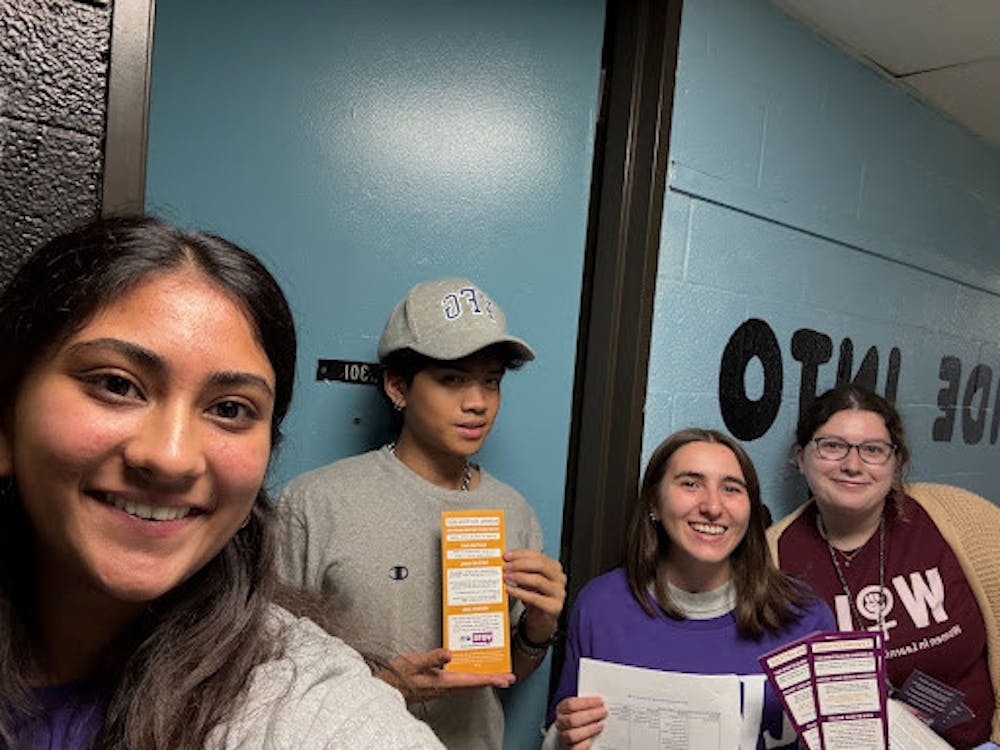By Jack Salaki
Correspondent
As the New Jersey gubernatorial election approaches, many college students across the state are getting ready to vote. However, numerous students are still unsure of how voting works or if their vote matters.
That’s where Professor Cecilia Colbeth’s freshman year seminar class comes in. The course, part of the Women in Learning and Leadership program, is titled “Rebel Girls: How Girls Do Activism.” The class partnered with the League of Women Voters, a non-profit, non-partisan organization with over 1 million members and supporters across all 50 states. The organization's goal is to ensure that everyone has access to voting and to empower voters by helping them register and understand the process.
The freshmen class also partnered with the Million Voters Project, located in New Jersey The project is non-partisan and consists of community organizations, faith groups and labor unions, with the goal of getting 1 million voters engaged in the upcoming gubernatorial election through canvassing efforts.
Many students in Colbeth’s class were already interested in politics. Canvassing was simply a way to get more directly involved in making an impact.
“I’ve always been around politics. My grandfather was mayor for 16 years. I want to work in government one day, maybe even as a congresswoman,” said Madison Graham, a history major and canvasser.
Canvassing was a new experience for Graham.
“Canvassing really opened my eyes. It showed me how many people don’t realize how important every election is — not just the presidential ones,” Graham said.
Many canvassers said the students they met were either uninterested or unaware of how the voting process worked.
“A lot of people were either uninformed or really only understood the presidential election and didn't understand the point of the gubernatorial election,” said Shrika Dogiparthi, an economics major and canvasser.
Gianna Facciponti, a nursing major and canvasser, echoed this point. “A lot of people didn’t think voting would affect them, even when the issues directly would,” she said.
Canvassers said that students who were uninterested in the governor’s race often felt uneducated about the candidates and what they represented.
“Because of how busy college is, people don't put it on their list of priorities,” said Mary Januszka, an education major and canvasser.
Another point that canvassers made was about the publicity of the gubernatorial race. Many students said the race hasn’t been as talked about or publicized in the same way as the presidential race last year, which is why they didn’t know much about the candidates.
The canvassers knocked on 30 doors across campus to reach out to students. Zoe King, a chemistry major and canvasser, said that 17 people answered their doors out of the 30 she knocked on, and six of those were registered to vote.
Canvassers said many students didn’t go into detail about specific issues they cared about, since the effort was mainly about encouraging voter participation. However, two of the most common issues mentioned were reproductive rights and the cost of living in New Jersey.
Colbeth reflected on what her students learned from the project.
“As one of my students stated, every seat or vacancy that there is an election for is just as important as voting for a U.S. Representative and Senator, a governor, or a president. School Board positions, local or township positions, state level representatives all play a critical part in our democracy and the future well-being of our country as a whole,” she said.
Canvassing on campus also taught students that the freedom to vote is a nonpartisan issue, according to Colbeth.
“No matter which party you align with, using the power of your vote is vital,” Colbeth said.
Early voting for the gubernatorial election began on Oct. 25 and continues through Nov. 2. Hours are Monday to Saturday from 10 a.m. to 8 p.m., and Sunday from 10 a.m. to 6 p.m. Election Day is Nov. 4. Polls will be open from 6 a.m. until 8 p.m.
Check your voter registration status here: https://voter.svrs.nj.gov/registration-check







